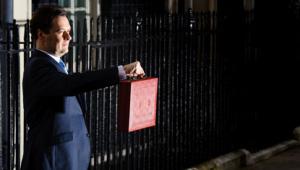The chancellor's announcement of spending cuts is largely hype to reassure the markets - nothing on that scale can be achieved in practice
Most people regard Peter Hitchens, Mail on Sunday columnist, global warming denier and supporter of capital punishment, as wholly misguided. And when he argued on BBC1’s Question Time that nothing like the cuts announced two days earlier in George Osborne’s emergency Budget would ever happen, I saw it as further evidence of his mistaken view of the world. So, to judge by their bemused reactions, did the rest of the panel.
But after a few days of reflection, I think Hitchens must be right, and the rest of us insane if we think average cuts of 25% across Whitehall are achievable. Since the NHS, education and defence will get special treatment, other departments, it is reckoned, will have to reduce spending by around 33%.
How is the Ministry of Justice, for example, supposed to manage that? By closing all the prisons? That still wouldn’t be quite enough; the courts would probably have to close, too. Will the Home Office, to meet its target, sack 85% of police officers? Education might have to make only 10% cuts, but that’s still equivalent to half the nation’s schoolteachers.
Osborne’s suggestion that such mind-boggling cuts can be averted by further savings in welfare is equally implausible. Taking a sharp axe to Incapacity Benefit might sound like a smart idea. But once wheelchair users start chaining themselves to Downing Street railings, it will seem less appealing. As for eradicating ‘dependency’, the middle-classes will soon tire of that aspiration when, on the steps of the opera house, pallid young women thrust scrawny babies at them.
Voters can contemplate multibillion- pound cuts with equanimity when they are just figures. It’s like those credit card bills you run up abroad where everything is priced in funny money. But when they confront the reality, the public will fight for every police station, every library, every school, every meals-on-wheels service, every theatre subsidy, every road pothole that goes unrepaired. It is inconceivable that ministers, faced with a thousand aggrieved lobbyists, will not placate some of them.
Osborne and his colleagues probably believe that, by setting the bar high now, lowering it later will make them seem flexible and caring. Expecting to lose two
legs, voters will be overjoyed when only one is cut off. I am not so sure. Your average voter tends to expect that everybody’s legs will be cut off except their own. Osborne (or his successor) will risk appearing weak and indecisive, while still attracting the loathing of the newly amputated.
The chancellor, however, has another electorate in mind, one that controls politicians far more effectively than voters in Barnsley or Basildon or, for that matter, in Baltimore or Barcelona. The real audience for his emergency Budget – the natives that truly understand the currency of public spending budgets enumerated in billions of pounds – is the bond markets. It is to pacify them, and ensure governments are still creditworthy, that finance ministers frame their budgets.
The bond markets, you might say, are wrong. If governments slash spending, they will provoke a renewed recession and end up less capable than ever of repaying their debts. That applies particularly to the UK, which, having congratulated itself on keeping out of the euro, now seems resolved to act as though it shared the euro’s sovereign debt crisis. Osborne’s Budget has boosted the pound, making the export-led growth on which he pins his hopes still less likely. But that is beside the point: the wisdom of the age is that bond markets must be obeyed even when they are wrong.
Appearance, nevertheless, is all. The bond markets – and the agencies that rate sovereign credit – want to see a ‘tough’ budget. They want big numbers in the deficit reduction column. They do not concern themselves with political practicalities. Lending money is all about trust, and Osborne wants to persuade the markets that they can trust him to do whatever is necessary.
In a year or two, the mood might have changed; the markets might favour countries that are pressing full steam ahead for growth or their attention may have wandered onto something quite different, such as corporate debt. Osborne’s gamble is that, when he reins in his ambitions for cuts, they will be looking the other way.
Peter Wilby is the former editor of the New Statesman











